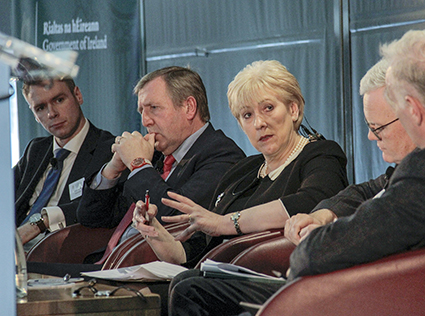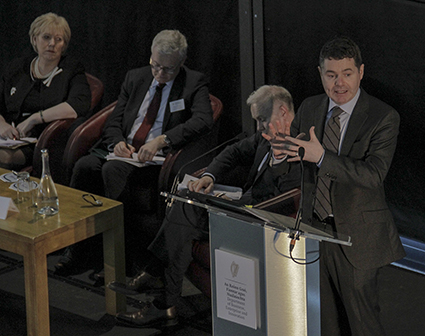Event is part of a series of ongoing stakeholder engagements by Government on Brexit
Study is part of the Government’s response to Brexit; is there as a guide to help prevent the worst from happening
Study undertaken on the basis of no policy change by Government; in reality, steps are being taken across Departments to minimise the impact of Brexit

The Minister for Business, Enterprise & Innovation, Heather Humphreys, today (Wednesday, 21 February 2018) hosted over 200 stakeholders at an event in Croke Park to discuss the results of the Copenhagen Economics study on the trade impacts of Brexit. The Minister’s Department commissioned Copenhagen Economics to undertake the independent study, which analyses potential new barriers that might result from a number of Brexit scenarios. It considers the implications for Irish trade and the economy out to 2030.
The Minister was joined at the event by the Minister for Finance & Public Expenditure and Reform, Paschal Donohoe, and the Minister for Agriculture, Food and the Marine, Michael Creed, as well as individual companies, business representative organisations, union representatives, enterprise agencies and policy makers.
Minister Humphreys said:
“I think it is fair to say that the report from Copenhagen Economics makes for stark reading. Although our economy is expected to record strong growth out to 2030 regardless of the final scenario, it is clear that Ireland will be the most ‘Brexit-impacted’ country in the EU. It is also clear that the impact will fall most heavily on certain sectors, and on the regions.
“However, it’s important to remember that the analysis is undertaken on the basis of no policy change. In reality, the Government is engaged in detailed work to prepare for the UK’s exit with a clear focus on the most impacted sectors, in parallel to our work on negotiations in Brussels. This was further evidenced at the launch of Project Ireland 2040 on Friday, which aims to Brexit-proof our economy by investing in the future.”
Minister Humphreys outlined important steps already being taken by Government to prepare our economy for Brexit including through Project Ireland 2040, Budget 2017 & 2018, and the Action Plan for Jobs 2017 & 2018. These supports include a rolling €30m Regional Enterprise Development Fund; a €500m Disruptive Technologies Fund; a €300m Brexit Loan Scheme for SMEs; a €25m Brexit Response Loan Scheme for the agri-food sector; increased funding for the Department of Foreign Affairs and Trade to open six new diplomatic missions as part of Global Footprint 2025; bespoke supports for businesses through the enterprise agencies, such as the Brexit SME Scorecard and the Market Discovery Fund; 100 extra staff for EI and the IDA; and a series of Brexit Advisory Clinics.
In relation to her own Department, the Minister said:
“In November, my Department published a comprehensive response to Brexit in ‘Building Stronger Business’ setting out what we are doing to help firms compete, enable firms to innovate, support firms to trade and negotiating for the best possible outcome.”
Minister Humphreys continued,
“The Copenhagen Economics study gives us detailed evidence of the potential impacts of different scenarios and what it may mean for individual sectors. This will help us to continue to evolve our response to Brexit. It will also help to inform our negotiating position as we enter discussions about the future relationship between the EU and the UK. The Government remains determined to get the best possible deal for the Irish people, negotiating as part of the EU 27.”
The event included a presentation by the authors of the report, Copenhagen Economics, which showed that in all scenarios, the Irish economy is expected to grow but Brexit is expected to have a dampening effect on that growth. Under a relationship such as the EEA type scenario, the impact of Brexit would be to dampen growth by 2.8%, in a worst-case WTO scenario, however, that dampening effect could reach 7%. The extent of regulatory divergence between the EU and UK post Brexit will be a key component of the impact. Five sectors account for 90% of the impact – Agri-food, Pharma-chemicals, Electrical Machinery, Wholesale & Retail, and Air Transport.
The Minister for Agriculture, Food and the Marine, Michael Creed, took part in a panel discussion with heads of the Irish Pharmaceutical Healthcare Association, Retail Ireland, and the Irish Exporters Association to discuss the sectoral implications of Brexit.
Minister Creed said:
“The agri food sector is a critically important contributor to the overall economy and employment creation, particularly in rural Ireland. The Copenhagen Economics study confirms that the sector is the most acutely at risk from Brexit, given its significant reliance on UK market outlets. My Department and its agencies will continue to work with the sector to prepare it for all eventualities, including through the introduction of measures to improve its competitiveness, by reducing cash flow pressures through the introduction of low cost finance, through the provision of advice on supply chain efficiencies and by investing in marketing and promotion to ensure that the sector has the widest possible global market footprint.”

Speaking at the event, the Minister for Finance & Public Expenditure and Reform, Paschal Donohoe, outlined the Government’s longer-term strategy to prepare our economy and our companies to meet the challenges of Brexit. Minister Donohoe said:
“Brexit is a challenge of historic proportions for this country, for all of us in Government and across the island of Ireland. The challenges posed by Brexit make preparation by Government and businesses essential as we navigate the road ahead. The Government is working hard to plan for Brexit through the adoption of sound economic and budgetary policies that will stand us in good stead and ensure that we are well positioned to avail of the opportunities, and equipped to handle the challenges, that lie ahead. We are putting important plans and strategies in place at national and sectoral level, including the Action Plan for Jobs, the Trade and Investment Strategy and now the National Development Plan and the National Planning Framework, which together form our long-term vision for our country in the form of Project Ireland 2040. The Copenhagen Economics Study is an important contribution to this work, both to inform our approach to the EU level negotiations and to prepare our economy for the new reality of an EU without membership of the UK.”